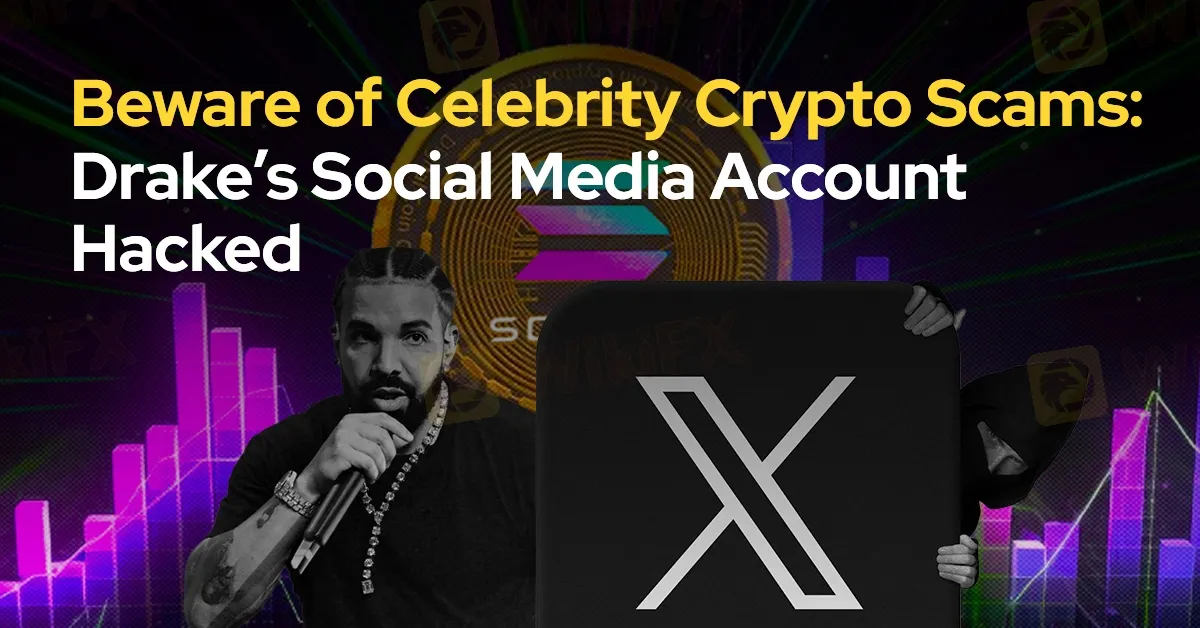简体中文
繁體中文
English
Pусский
日本語
ภาษาไทย
Tiếng Việt
Bahasa Indonesia
Español
हिन्दी
Filippiiniläinen
Français
Deutsch
Português
Türkçe
한국어
العربية
Beware of Celebrity Crypto Scams: Drake’s Social Media Account Hacked
Abstract:Celebrity-backed cryptocurrency scams have been making headlines again, with fans of Canadian rapper Drake falling victim to a fraudulent memecoin scheme.

Celebrity-backed cryptocurrency scams have been making headlines again, with fans of Canadian rapper Drake falling victim to a fraudulent memecoin scheme. The incident underscores a growing trend of scammers exploiting high-profile social media accounts to promote dubious tokens.
Drake‘s X (formerly Twitter) account was reportedly hacked over the weekend, leading to the promotion of a Solana-based memecoin named ANITA. The token, linked to the rapper’s cartoon alter ego “Anita Max Wynn,” was marketed under the guise of his well-known love for gambling. The name itself, “Anita Max Wynn” (a play on “I need a max win”), added a layer of believability to the scam, as did the claim that the token was launched in partnership with the gambling platform Stake.

Drake has a legitimate partnership with Stake, which further blurred the lines for his followers. The scam posts on his profile were amplified by the fact that his top pinned post also promotes the platform. Adding to the confusion, the name of the fraudulent token aligned with Drakes upcoming “Anita Max Wynn Tour,” scheduled for 2025 in Australia and New Zealand. Some fans may have assumed the token was part of a promotional effort for the tour.
Despite the posts being swiftly deleted and the token‘s associated account on X being suspended, the damage was already done. Reports show that during the short time the scam was live, trading volume for ANITA exceeded $5 million USD (approximately $7.8 million AUD). Many of Drake’s 39 million followers were drawn into the scheme before realising its fraudulent nature.
Drakes case is just the latest in a series of high-profile social media hacks targeting fans through fake cryptocurrencies. Crypto investigator ZachXBT recently traced similar scams to an Australian ex-eSports player known as Serpent. This individual has been linked to hacks involving celebrities such as Usher, Wiz Khalifa, and actor Dean Norris.
Other prominent figures, including Cardi B, Doja Cat, and the band Metallica, have also seen their accounts used to promote fake tokens. Even organisations like the Cardano Foundation have fallen prey to such tactics.
These scams tend to spike during crypto bull markets when increased public interest in digital assets provides fertile ground for scammers. With more newcomers entering the market, fraudulent schemes targeting celebrity followers become an effective way to capitalise on the excitement and lack of experience among investors.

Disclaimer:
The views in this article only represent the author's personal views, and do not constitute investment advice on this platform. This platform does not guarantee the accuracy, completeness and timeliness of the information in the article, and will not be liable for any loss caused by the use of or reliance on the information in the article.
Read more

Anti-Scam Groups Urge Tougher Action on Fraudsters in UK
Anti-scam groups demand tougher police action on fraudsters as UK fraud rates surge 19%, targeting millions in a penalty-free crime spree exposed by a $35m scam leak.

Philippines Deports 29 Indonesians Linked to Online Scam Syndicate in Manila
Online scam groups in the Philippines trick Filipinos into gambling and love scams, from Manila to Bacolod, causing trafficking and pain as police fight back.

FCA Warns Against 10 Unlicensed or Clone Firms
Unlicensed and clone firms pose risks; FCA urges investors to verify authorization.

CySEC Warns Against 14 Unlicensed Investment Websites
CySEC urges caution as 14 websites lack proper authorization.
WikiFX Broker
Latest News
How Crypto Trading Transforms FX and CFD Brokerage Industry
UK would not hesitate to retaliate against US tariffs - No 10 sources
FCA Warns Against 10 Unlicensed or Clone Firms
CySEC Warns Against 14 Unlicensed Investment Websites
Top Currency Pairs to Watch for Profit This Week - March 31, 2025
Will natural disasters have an impact on the forex market?
Philippines Deports 29 Indonesians Linked to Online Scam Syndicate in Manila
Navigating the Intersection of Forex Markets, AI Technology, and Fintech
Exposed: Deceptive World of Fake Trading Gurus – Don’t Get Fooled!
AI-Powered Strategies to Improve Profits in Forex Trading
Currency Calculator







